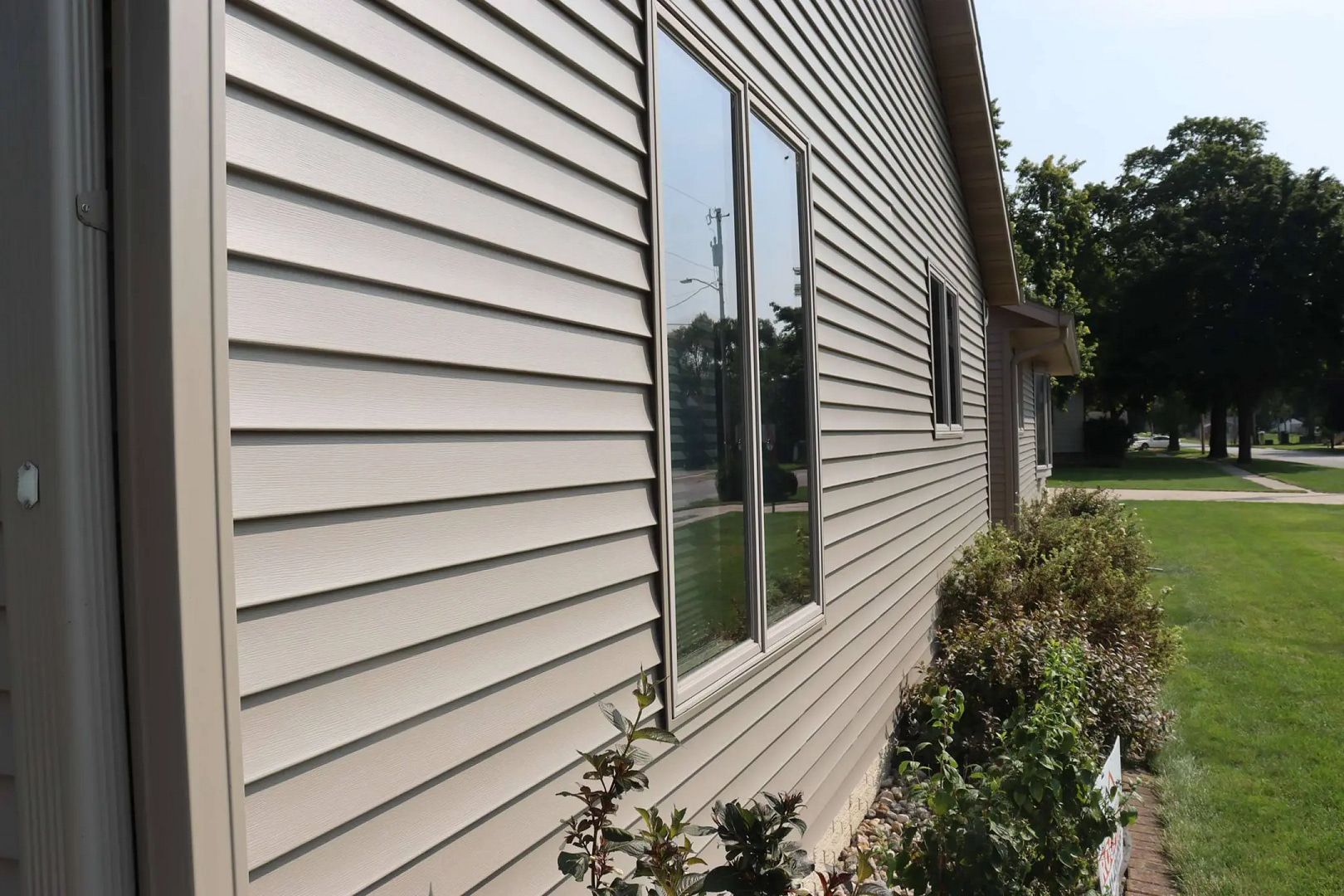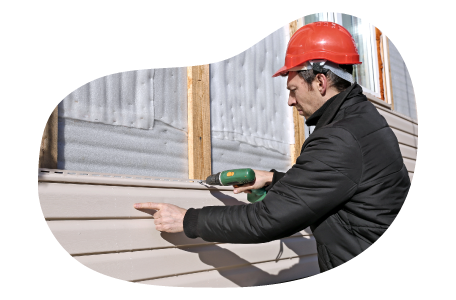Affordable Morris Siding Contractor Offering Superior Craftsmanship
Affordable Morris Siding Contractor Offering Superior Craftsmanship
Blog Article
The Important Guide to the Numerous Sorts Of Siding and Their Distinct Benefits
In the realm of home enhancement, picking the ideal siding is a critical decision that affects both aesthetic appeal and useful performance. With so many alternatives to take into consideration, which home siding material really stands out for your specific job?
Timber House Siding
Timber home siding, a prominent option for household exteriors, supplies an ageless visual that integrates natural beauty with architectural stability. This exterior siding product is available in various designs, consisting of clapboard, shingles, and board-and-batten, enabling property owners to customize their façade to match their style preferences. Timber exterior siding is generally crafted from durable species such as cedar, redwood, or yearn, which are known for their resilience and capability to stand up to ecological stress factors.
One of the main advantages of wood exterior siding is its outstanding insulation residential properties, which can contribute to power effectiveness and reduced heating expenses. Furthermore, timber siding is naturally degradable, making it an eco-friendly option when sourced sustainably. Normal upkeep, consisting of paint or staining, can prolong its life expectancy and improve its appearance, enabling home owners to protect the natural beauty of the wood.
Nonetheless, possible disadvantages include vulnerability to bugs, rot, and climate damage, requiring appropriate treatment and upkeep - morris siding contractor. Regardless of these problems, when correctly cared for, timber home siding can provide a sturdy and gorgeous solution that boosts the personality of a home while supplying a cozy, inviting environment

Plastic House Siding
Vinyl exterior siding has actually arised as a leading option for home owners looking for a low-maintenance outside choice that combines longevity and cost. This versatile material is crafted from polyvinyl chloride (PVC), making it immune to different weather conditions, including dampness and UV rays. Consequently, vinyl exterior siding does not warp, rot, or fade, guaranteeing resilient aesthetic charm.
Among the main advantages of vinyl exterior siding is its extensive variety of shades and designs, permitting house owners to achieve the preferred search for their home without the requirement for constant repainting. In addition, plastic exterior siding is easy to mount, which can dramatically reduce labor costs during building and construction or restoration jobs.
Plastic exterior siding likewise adds to energy efficiency. Several alternatives attribute insulation support, which enhances thermal performance, helping to keep comfy indoor temperature levels and potentially decreasing energy bills. Moreover, its smooth surface assists in very easy cleansing, requiring only routine washing with a garden hose to get rid of dust and particles.
Fiber Cement House Siding
Fiber cement exterior siding has acquired traction among building contractors and home owners alike due to its amazing mix of longevity and visual flexibility. Composed of a mix of cellulose, concrete, and sand fibers, this siding choice is engineered to withstand extreme weather, including high winds, hefty rainfall, and temperature level changes, making it a long-lasting choice for property outsides.

Among the primary benefits of fiber cement house siding is its resistance to parasites, such as termites, and its non-combustible nature, offering improved fire security. morris siding contractor. Furthermore, it is readily available in a broad Going Here array of shades, textures, and styles, permitting house owners to achieve their desired aesthetic without compromising performance
Another benefit is its low upkeep needs; fiber concrete house siding normally needs paint or discoloration every 5-10 years, which is much less regular than various other materials. Its durability adds to a reduced general price of ownership, as it reduces the need for regular repairs or replacements.
Inevitably, fiber concrete house siding stands for an exceptional financial investment for those seeking a resistant, eye-catching, and functional exterior alternative, integrating both type and function to improve the home's aesthetic charm.
Metal Siding
The appeal of steel home siding hinges on its robust resilience and modern-day aesthetic allure, making it a preferred choice for contemporary architecture. Offered in products such as aluminum and steel, steel home siding provides a series of shades and finishes, permitting home owners to attain an individualized appearance that complements their design vision.

Energy effectiveness is another substantial benefit, as several metal home siding items are created with insulation choices that assist regulate interior temperature levels. This can lead to minimized energy costs over time. Furthermore, metal home siding is commonly recyclable, making it an eco pleasant option for sustainability-minded homeowners.
The installation process for steel home siding can be reasonably simple, resulting in a quicker turn-around time for building jobs. Generally, steel exterior siding integrates functionality and design, making it a functional alternative for those seeking a aesthetically attractive and enduring outside coating.
Brick and Stone House Siding
Block and rock house siding sticks out as a hop over to here classic selection that improves the aesthetic appeal of any home. Recognized for their durability and low maintenance, these products give an exceptional return on investment while elevating the residential or commercial property's curb allure. Available in various colors, textures, and patterns, block and rock can be tailored to fit diverse architectural styles, from traditional to modern-day.
One of the key advantages of brick and rock siding is their energy efficiency. Both products possess natural protecting homes that assist regulate indoor temperature levels, possibly decreasing heating & cooling costs. Additionally, they offer superior fire resistance compared to various other siding choices, adding to enhanced safety.
One more advantage is their long life. Block and rock can last for years, commonly requiring very little upkeep past occasional cleansing. Unlike timber house siding, they are unsusceptible pests and rot, ensuring a long-lasting outside that endures the elements.
Final Thought
In summary, the option of house siding substantially impacts a home's visual allure, energy effectiveness, and maintenance needs. Each sort of Resources exterior siding-- whether wood, plastic, fiber brick, cement, or metal and stone-- offers unique benefits tailored to numerous house owner preferences and environmental problems. Comprehending these alternatives makes it possible for informed decisions that boost both the toughness and aesthetic charm of household outsides. Eventually, selecting the ideal exterior siding is essential for achieving a balance between functionality and layout in domestic style.
One of the main benefits of wood exterior siding is its excellent insulation homes, which can add to power performance and lower home heating costs. Furthermore, wood siding is naturally degradable, making it an environmentally pleasant choice when sourced sustainably.One of the key advantages of metal home siding is its resistance to various environmental aspects.Energy performance is one more substantial benefit, as several metal siding products are created with insulation choices that aid regulate interior temperature levels. Each kind of home siding-- whether wood, plastic, fiber metal, cement, or brick and stone-- provides special benefits tailored to different home owner choices and ecological conditions.
Report this page